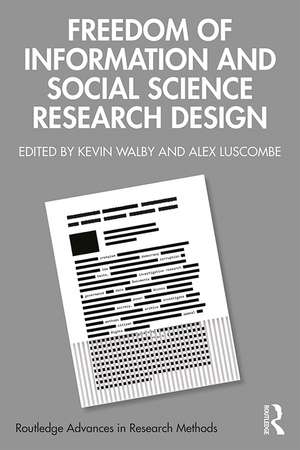Freedom of Information and Social Science Research Design: Routledge Advances in Research Methods
Autor Kevin Walby, Alex Luscombeen Limba Engleză Paperback – 11 dec 2019
This multidisciplinary volume demonstrates how freedom of information law and processes can contribute to social science research design across sociology, criminology, political science, anthropology, journalism and education. Comparing the use of freedom of information in research design across the United Kingdom, the United States, Australia, Canada and South Africa, it provides readers with resources to carry out freedom of information requests and considers the influence such requests can have on debates within multiple disciplines. In addition to exploring how scholars can use freedom of information disclosures in conjunction with interview data, archival data and other datasets, this collection explains how researchers can systematically analyse freedom of information disclosures. Considering the challenges and dilemmas in using freedom of information processes in research, it examines the reasons why many scholars continue to rely on more easily accessible data, when much of the real work of governance, the more clandestine but consequential decisions and policy moves made by government officials, can only be accessed using freedom of information requests.
| Toate formatele și edițiile | Preț | Express |
|---|---|---|
| Paperback (1) | 367.99 lei 6-8 săpt. | |
| Taylor & Francis – 11 dec 2019 | 367.99 lei 6-8 săpt. | |
| Hardback (1) | 1000.27 lei 6-8 săpt. | |
| Taylor & Francis – 3 dec 2019 | 1000.27 lei 6-8 săpt. |
Din seria Routledge Advances in Research Methods
-
 Preț: 151.96 lei
Preț: 151.96 lei -
 Preț: 309.99 lei
Preț: 309.99 lei - 8%
 Preț: 388.35 lei
Preț: 388.35 lei -
 Preț: 282.50 lei
Preț: 282.50 lei -
 Preț: 334.09 lei
Preț: 334.09 lei -
 Preț: 302.64 lei
Preț: 302.64 lei -
 Preț: 190.95 lei
Preț: 190.95 lei - 25%
 Preț: 768.46 lei
Preț: 768.46 lei -
 Preț: 361.28 lei
Preț: 361.28 lei -
 Preț: 370.41 lei
Preț: 370.41 lei - 31%
 Preț: 762.58 lei
Preț: 762.58 lei -
 Preț: 359.17 lei
Preț: 359.17 lei - 18%
 Preț: 1058.65 lei
Preț: 1058.65 lei -
 Preț: 356.44 lei
Preț: 356.44 lei - 18%
 Preț: 1053.92 lei
Preț: 1053.92 lei - 18%
 Preț: 1033.22 lei
Preț: 1033.22 lei -
 Preț: 396.29 lei
Preț: 396.29 lei -
 Preț: 414.91 lei
Preț: 414.91 lei - 18%
 Preț: 1000.27 lei
Preț: 1000.27 lei -
 Preț: 483.49 lei
Preț: 483.49 lei - 18%
 Preț: 1057.09 lei
Preț: 1057.09 lei -
 Preț: 389.38 lei
Preț: 389.38 lei - 17%
 Preț: 850.68 lei
Preț: 850.68 lei - 18%
 Preț: 999.51 lei
Preț: 999.51 lei - 18%
 Preț: 1118.46 lei
Preț: 1118.46 lei - 18%
 Preț: 997.77 lei
Preț: 997.77 lei - 26%
 Preț: 652.84 lei
Preț: 652.84 lei -
 Preț: 456.06 lei
Preț: 456.06 lei -
 Preț: 489.26 lei
Preț: 489.26 lei - 18%
 Preț: 1000.27 lei
Preț: 1000.27 lei -
 Preț: 362.05 lei
Preț: 362.05 lei - 13%
 Preț: 336.80 lei
Preț: 336.80 lei - 18%
 Preț: 1107.47 lei
Preț: 1107.47 lei - 26%
 Preț: 764.20 lei
Preț: 764.20 lei -
 Preț: 387.99 lei
Preț: 387.99 lei - 25%
 Preț: 826.86 lei
Preț: 826.86 lei -
 Preț: 340.19 lei
Preț: 340.19 lei -
 Preț: 394.78 lei
Preț: 394.78 lei - 18%
 Preț: 1060.25 lei
Preț: 1060.25 lei - 26%
 Preț: 764.20 lei
Preț: 764.20 lei - 18%
 Preț: 1055.66 lei
Preț: 1055.66 lei
Preț: 367.99 lei
Nou
70.41€ • 73.52$ • 58.28£
Carte tipărită la comandă
Livrare economică 04-18 aprilie
Specificații
ISBN-10: 1138345741
Pagini: 266
Ilustrații: 23 Tables, black and white
Dimensiuni: 156 x 234 x 15 mm
Greutate: 0.41 kg
Ediția:1
Editura: Taylor & Francis
Colecția Routledge
Seria Routledge Advances in Research Methods
Locul publicării:Oxford, United Kingdom
Public țintă
Postgraduate and UndergraduateCuprins
Notă biografică
Alex Luscombe is a PhD Candidate in criminology at the University of Toronto, Canada. He has published widely on issues of policing, corruption, secrecy and Freedom of Information law in Canada and beyond. His past research has appeared in Social Forces, British Journal of Criminology, Sociology, International Political Sociology, Canadian Journal of Criminology & Criminal Justice, Policing & Society, Criminology & Criminal Justice, as well as a number of other academic journals and edited volumes. He serves on the editorial board of Criminological Highlights, a University of Toronto publication aimed at providing criminal justice practitioners with an accessible overview of recent criminological research. He is also a Junior Fellow at the University of Toronto’s Massey College.
Descriere
This multidisciplinary volume demonstrates how freedom of information law and processes can contribute to social science research design across sociology, criminology, political science, anthropology, journalism and education. Comparing the use of freedom of information in research design across the United Kingdom, the United States, Australia, Canada and South Africa, it provides readers with resources to carry out freedom of information requests and considers the influence such requests can have on debates within multiple disciplines. In addition to exploring how scholars can use freedom of information disclosures in conjunction with interview data, archival data and other datasets, this collection explains how researchers can systematically analyse freedom of information disclosures. Considering the challenges and dilemmas in using freedom of information processes in research, it examines the reasons why many scholars continue to rely on more easily accessible data, when much of the real work of governance, the more clandestine but consequential decisions and policy moves made by government officials, can only be accessed using freedom of information requests.
